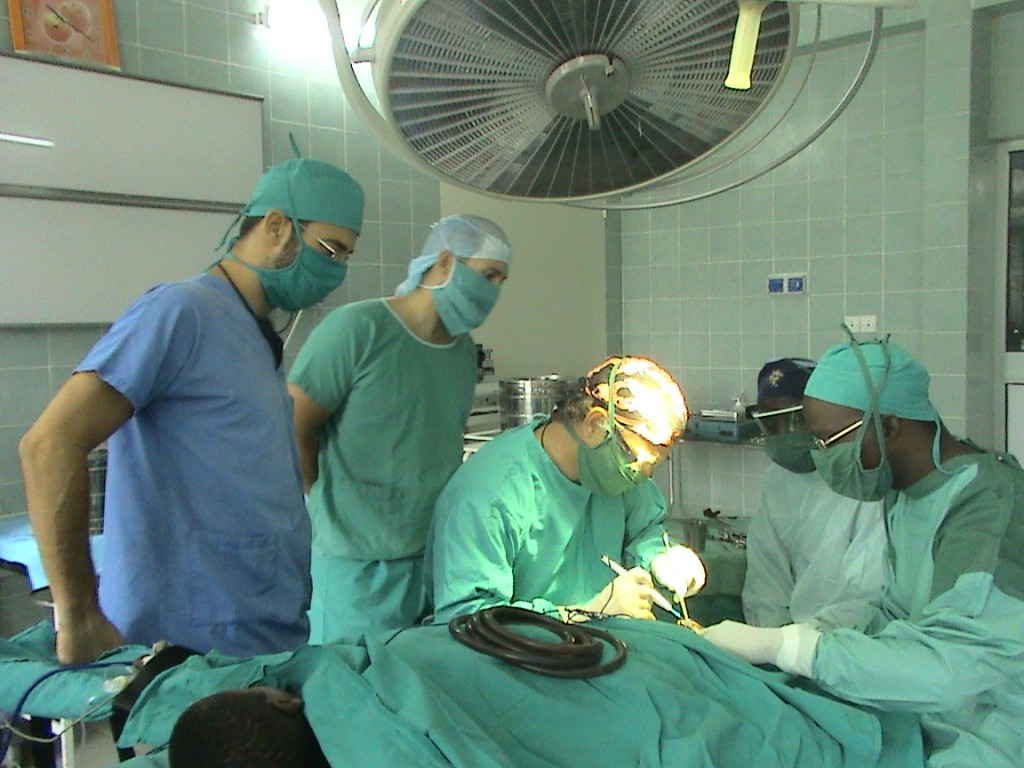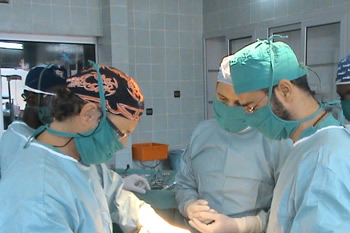International cooperation
Labour humanitaria: be a doctor in another world
 A caring concern has moved to Dr. Andrés Camprodon to help humanely, in the field of orthopedic surgery and traumatology, people in disadvantaged regions of our planet. This concern has led to stays in hospitals and precarious, sometimes, random experiences, but they have always been rewarding experiences.
A caring concern has moved to Dr. Andrés Camprodon to help humanely, in the field of orthopedic surgery and traumatology, people in disadvantaged regions of our planet. This concern has led to stays in hospitals and precarious, sometimes, random experiences, but they have always been rewarding experiences.
In September 1992, immediately after qualifying as a specialist he made his first international cooperation activity in Gitega, Burundi, where there was a very high rate of people with disabilities as a result of the harsh living conditions she was forced to endure the population.
Humanitarian cooperation has always been an extremely successful company, because for some people in disadvantaged regions, voluntary and selfless practice of orthopedic surgeons is the only possibility to undergo operations to resolve a health problem unsolvable other way.
"I think that somehow it is our duty to give back to society, the most disadvantaged, what society has given to us ". Dr.. Andrés Camprodon
 In August 2009, Dr. Andres Camprodon cooperated with the San Juan de Dios Hospital, en Tangieta, Benin, and performing deformation child repairing orthopedic surgery.
In August 2009, Dr. Andres Camprodon cooperated with the San Juan de Dios Hospital, en Tangieta, Benin, and performing deformation child repairing orthopedic surgery.
"We live in a region with abundant resources, there are other countries where people are dying from diseases and ailments that while anyone here not die '. Dr.. Andrés Camprodon
Dr. Andrew Camprodon has 'infected' with a team of health professionals working environment (Surgeons, medical, nurses, osteópatas…) with which it has cooperated in programs of medical and surgical treatment in countries with limited health resources, to improve the living conditions of people.
"The last days of stay in a country, after working from 8 am to 8 night in sometimes precarious conditions, resting and eating little, are the hardest moments. Sometimes long lines of people coming from far away form, with a child or a family, for what we operate. We ask cuando going to return. They know we are their only chance. It is difficult to leave and leave behind ".
El Dr. Andrés Camprodon combines his professional life with the altruistic volunteer.

"On one occasion, in Burundi, I had to be assisted in the operating room by two Polish nuns who had found a baby 2 months protected under the body of his dead mother. A bayonet had severed her mid-thigh and had to amputate his leg ». Dr.. Andrés Camprodon
International cooperation: how is a hospital in another world
"Cooperation is always rewarding, receive more than you give ". Dr.. Andrés Camprodon
It is necessary to raise awareness of the enormous impact of musculoskeletal injuries and diseases in poor countries, which was further discussed in a fight against infectious diseases, such as tuberculosis, malaria or AIDS.
As an orthopedic surgeon, el Dr. Andrés Camprodon takes the opportunity to train in countries cooperating, for he is aware that, ultimately, will have a lasting and sustainable impact on the local health system.
It is necessary to train health professionals in developing countries; this remains a global problem unresolved. Equipment needs and facilities in these countries grow every day.
The 75% The world does not have direct access to an orthopedic surgeon.
In some countries the doctor / patient ratio is 1 a 77.000. The orthopedic / surgeon patient ratio is even more scandalous. For example, when Dr. Camprodon cooperated humanely in Burundi only lived three trauma, and two of them were traveling from the capital (Bujumbura).
"When we travel we seek to fill the bag of drugs and all that we believe can be useful. The practice of medicine and surgery changes in the countries where we cooperate; we sometimes oppressive heat, marathon days, with do not know if we will have the means to orthopedic surgery ...
Everything is immediate and requires solution. You have to solve the problems as presented, improvising means, between a constant influx of patients from faraway places sometimes where we.
The cases we serve daily in a day of cooperation in a developing country varies, but one day an orthopedic surgeon can visit some 90 Patients requiring surgery, is very difficult to select the priorities because no surgical material for all (screws, plates, prosthesis,…). Also prior medical screening by the locals is, bringing the 90% patients present complex cases ".

